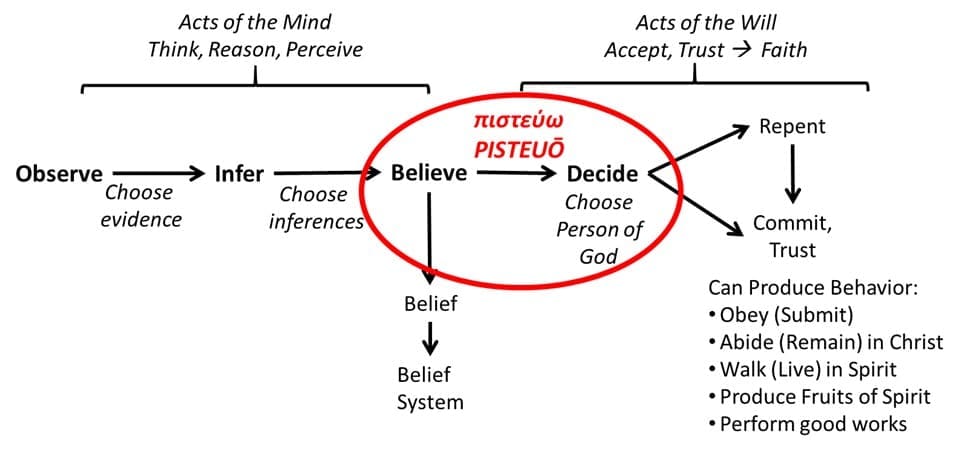Wisdom Wednesday: The Mind of Wisdom – Part 3
References to the Mind in the New Testament
Submitted by Debbie’s Dad
While the Old Testament emphasized our innermost parts (similar concepts but distinguished and translated mind and heart), the New Testament provides more insight into the role of our mind in responding to God. Notice that Jesus quoted the Shema (Hear!) passage spoken by Moses but, He added the word for mind (Greek dianoia, meaning mind, disposition or though).
- Moses said: “Hear, O Israel! The Lord is our God, the Lord is one! 5 You shall love the Lord your God with all your heart and with all your soul and with all your might.” Deut. 6:4-6
- Jesus said: ‘You shall love the Lord your God with all your heart, and with all your soul, and with all your mind.’ (Jesus’ addition of the mind is underlined; this is cited in all three parallel passages in the Gospels cf. Matt. 22:37; Mark 12:30; Luke 10:27)
Why did Jesus add the word mind? We can only speculate, but to his audience that may have been influenced by Greek thought, He may have wanted to distinguish the thought process that needs to be yielded to God’s truth. He emphasized that His message was the truth (Cf. John 4:24; 5:33; 8:32; 8:45-46; 14:6; 16:13; 17:17;18:37).
The concepts of heart and mind are almost integrated in the New Testament (much as the innermost parts are in the Old Testament), yet we have a common understanding of two aspects of our lives:
- Our Mind: Thought, cognition, reasoning, our focus of attention (decision)
- Our Heart: Feelings, emotions, our will (determination)
In addition to the Greek word dianoia, another word, nous, is translated mind or understanding. This word is used once in the Gospels, by Luke, when he describes Jesus explaining how the Old Testament foretold His resurrection to his disciples. Luke said, Jesus “…opened their minds (nous) to understand the Scriptures” (Luke 24:45).
The mind can be opened to understand and reason (1 Cor. 14:14–19) and we are exhorted to control our mind (Romans 8:6–7).
The elements that we generally consider making up the process by which we perceive something and then come to believe in that thing (Figure 2-2) distinguish between intellectual aspects of believing and the acts of the will to trust:
- Observing – We observe God’s creation and the behavior of created beings. These observations lead to a general perception of the world, and then, deeper questions.
- Inference – We reason and infer things about the world, to form beliefs, and doubts about our existence.
- Believe Cognitively – Our reasoning leads to the things we believe about key questions. The “Big” questions include:
- Q1: Who am I and where did I come from? (Is there anything out there?) this is the Question of Existence;
- Q2: Why am I here? The Question of Purpose and Meaning;
- Q3: Where am I going? The Question of Destiny.
Paul addressed these questions by the observation and reasoning (thinking) we “know” of God’s existence: “For since the creation of the world His invisible attributes are clearly seen, being understood by the things that are made, even His eternal power and Godhead, so that they are without excuse, because, although they knew God, they did not glorify Him as God, nor were thankful, but became futile in their thoughts, and their foolish hearts were darkened.” Romans 1:20-21 (NKJV)
- Act on Belief, Commit to Decision and Results– Yet while we “know” (believe with near certainty) something, we must still choose to act. We may accept and trust in God by faith with the results described in the Epistles – our repentance (change of direction), obedience, walking in God’s Spirit, producing behaviors and good works. Or we may decide not to act on the knowledge and may deny or suppress the truth. Or, we may accept, trust and act on that knowledge.
Science generally uses the English term believe in the narrow sense to describe a purely rational measure of the cognitive process (a proposition is coherent, corresponds to observations and theory, and complete). But John’s Gospel uses the act “to believe” (pistueo, πιστεύω) in the wider concept of cognitive agreement by our mind and the act of the will of our heart to choose to act on the belief and trust in the object of belief – the Person of Jesus Christ (Figure below).

We see that our mind and heart must be open to see and act on the truth of Scripture. Jesus emphasized the truth throughout His ministry. And God’s truth can be apprehended by an open mind and a willing heart.